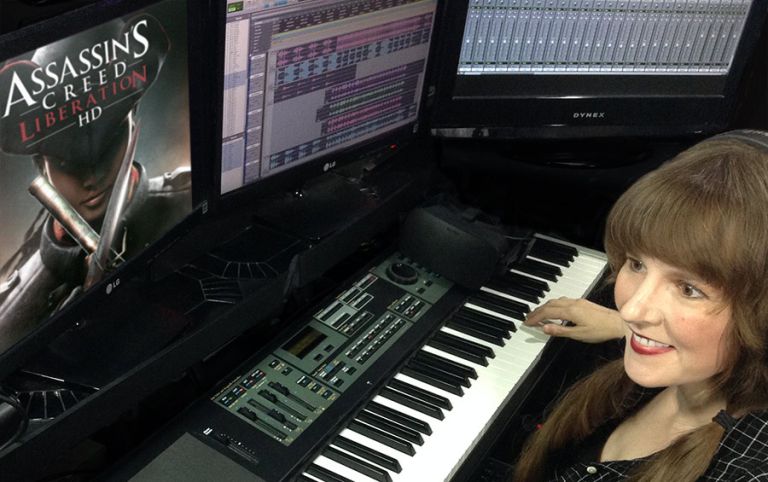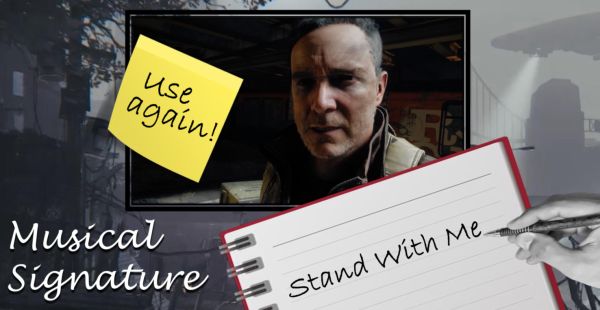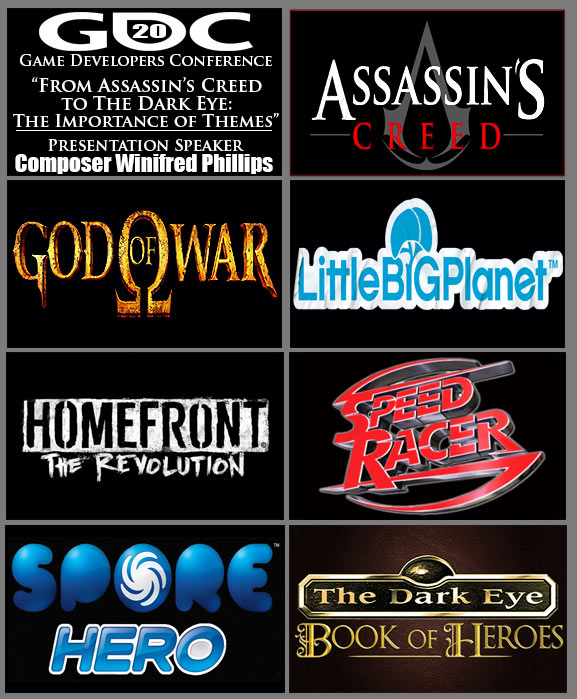
Featured Blog | This community-written post highlights the best of what the game industry has to offer. Read more like it on the Game Developer Blogs or learn how to Submit Your Own Blog Post
Game Composers and the Importance of Themes: Repetition in Game Music (Pt. 2)
The second installment of a five-part article series based on game composer Winifred Phillips' presentation during the GDC 2020 online conference. Session was entitled "From Assassin's Creed to The Dark Eye: The Importance of Themes."


By Winifred Phillips | Contact | Follow
Delighted you're here! I'm video game composer Winifred Phillips, and this is the second installment of my five article series based on the presentation I gave at the first-ever digital edition of the Game Developers Conference that took place this past March. My talk was entitled "From Assassin's Creed to The Dark Eye: The Importance of Themes" (I’ve included the official description of my talk at this end of this article). In my GDC 2020 presentation, I discussed the music I composed for several video game projects, including Assassin's Creed Liberation (Ubisoft), God of War (Sony Interactive America), LittleBigPlanet (Sony Interactive Europe), Homefront: The Revolution (Deep Silver), Speed Racer (Warner Bros Interactive), Spore Hero (Electronic Arts), and The Dark Eye: Book of Heroes (Wild River).
In the last article, we discussed the concept of the "hook" as it relates to thematic composition, and we explored how an awesome hook can function best from within a main theme track. In our discussion, we used both a famous example from the Star Wars franchise, as well as the main theme from one of my own recently-released game projects - The Dark Eye: Book of Heroes. Both examples included a fairly dynamic foreground melody, which made it a great example for our discussion of the role of the hook in thematic construction. So let's now consider what happens when we eschew such an attention-drawing melodic element and instead take a more subtle approach.
Assassin's Creed Liberation
When I was hired to compose the music for Assassin’s Creed Liberation, one of the first requested tracks was the main theme. So I’m sitting there in front of the keyboard, trying to start composing a main theme for an entry in one of the most popular video game franchises... and I’m thinking about what makes Assassin’s Creed unique: the surreal nature of being in the Animus. It's a virtual world that exists as an altered mental state, like dreaming or hypnosis. What could I do as the composer to evoke this feeling?

Around that time, there was some discussion of the four-chord technique that Hans Zimmer popularized in scores like Inception. I remember that there were a lot of opinions out the technique at the time, from experts and amateurs alike. The technique wasn’t original to him – it actually owes a lot to pop music construction – but Zimmer brought a bunch of attention to it. Something about a simple repeating four-chord progression feels very hypnotic. And so I thought – why not? Let’s figure out a four-chord progression, something that sounds interesting, and then base the whole track on it. I'd never done anything like that before. It could work.

So here they are – the four chords for the Assassin’s Creed Liberation main theme. It took a little while to settle on them, and then I recorded them using a really mellow synth pad – played them over and over and over again for about two minutes. Here’s what that was like:
The four-chords became the foundation of the main theme, and then it was just a matter of adding things to it. Lots of things.
So while there is plenty of melodic material in the main theme, the element that gets the most repetition is that sequence of four chords. We hear that four-chord pattern 14 times in the main theme alone. This gives the four-chord sequence some mnemonic heft within the body of the game’s score. It’s going to feel familiar when heard again, and that allows it to be meaningful when it reappears as a broken chord sequence during stealth gameplay:
Or when the four-chord shows up in the game’s main user-interface menus:
Repetition can serve as a powerful musical signature – whether by virtue of a bold and dynamic melody line, or a subtle chord progression. If an element pops up during music composition that seems perfect for recurrence, we have to stay on top of the situation, recognize this new composition opportunity and act on it. Let's look at an example from one of my other game projects.
Homefront: The Revolution
 In my music for the first person shooter Homefront the Revolution, I composed an emotional theme when an unlikely hero suddenly gives a remarkably inspiring speech about fighting back against oppression. Since the whole story centers on that idea, that musical signature took on a really iconic character and I privately named it the ‘Stand With Me’ theme, after a phrase from that inspirational speech. Afterwards, I made a mental note to use the ‘Stand With Me’ theme again if I had the chance. Turns out, I had several. Here it is as it was used in three different story missions:
In my music for the first person shooter Homefront the Revolution, I composed an emotional theme when an unlikely hero suddenly gives a remarkably inspiring speech about fighting back against oppression. Since the whole story centers on that idea, that musical signature took on a really iconic character and I privately named it the ‘Stand With Me’ theme, after a phrase from that inspirational speech. Afterwards, I made a mental note to use the ‘Stand With Me’ theme again if I had the chance. Turns out, I had several. Here it is as it was used in three different story missions:
Conclusion
In this article, we've taken a look at how more subtle thematic elements can add emotional weight to a game. We examined the four-chord theme of Assassin's Creed Liberation, and discussed how repetition helps to solidify its association with the game's core identity. We also talked about how themes can be linked with specific story ideas, and how this linkage can facilitate further repetition within the body of the game's musical score. In the next article of this series, we'll be exploring how variation and fragmentation can add utility to our musical themes. Along the way, I'll be sharing some of personal stories of my creative process for two of my game music projects - Spore Hero and LittleBigPlanet PS Vita. Until then, thanks for reading!
From Assassin's Creed to The Dark Eye: The Importance of Themes

(Game Developers Conference Session Description)
Through an exploration of her work composing music for games such as Assassin’s Creed Liberation, God of War, LittleBigPlanet and the upcoming RPG The Dark Eye: Book of Heroes, composer Winifred Phillips will examine the potential of thematic music to enable a game to stand out as special and unique.
By employing musical themes, a composer can infuse a game with a strong sense of character and originality.
According to research, music heard during activities is remembered vividly. Coupling this with the innately memorable nature of themes allows a game composer to create an indelible musical signature for any game. This talk will examine composition techniques that extend the life and utility of themes. Variation, development, figures, fragmentation, and motifs will be explored, along with examples of themes in combat, menus, cutscenes, and stingers. Finally, dynamic music construction will be considered, including workarounds to enable effective themes within interactive systems.
Takeaway
Using examples from several games, Phillips will discuss specific composition techniques designed to enhance the utility of thematic content. Attendees will learn how themes may be incorporated into specific game music asset types. Also included in the discussion: composition adjustments required by interactive music constructs.
Intended Audience
This session will present inspirational ideas for composers seeking to create distinctive musical signatures for their game projects. Discussion of thematic use within different types of game music assets may be helpful for audio developers engaged in preparing music design documents. The talk will be approachable for all levels.
 Winifred Phillips is a well-known video game composer whose latest project is the hit PlayStation 5 launch title Sackboy: A Big Adventure (soundtrack album now available). Popular music from Phillips' award-winning Assassin's Creed Liberation score is featured in the performance repertoire of the Assassin's Creed Symphony World Tour, which made its Paris debut with performances by a top 80-piece orchestra and choir. As an accomplished video game composer, Phillips is best known for composing music for games in five of the most famous and popular franchises in gaming: Assassin’s Creed, God of War, Total War, The Sims, and Sackboy / LittleBigPlanet. She is the author of the award-winning bestseller A COMPOSER'S GUIDE TO GAME MUSIC, published by the MIT Press. As one of the foremost authorities on music for interactive entertainment, Winifred Phillips has given lectures at the Library of Congress in Washington DC, the Society of Composers and Lyricists, the Game Developers Conference, the Audio Engineering Society, and many more. Phillips’ enthusiastic fans showered her with questions during a Reddit Ask-Me-Anything session that went viral, hit the Reddit front page, received 14.9 thousand upvotes, and became one of the most popular gaming AMAs ever hosted on Reddit. Follow her on Twitter @winphillips.
Winifred Phillips is a well-known video game composer whose latest project is the hit PlayStation 5 launch title Sackboy: A Big Adventure (soundtrack album now available). Popular music from Phillips' award-winning Assassin's Creed Liberation score is featured in the performance repertoire of the Assassin's Creed Symphony World Tour, which made its Paris debut with performances by a top 80-piece orchestra and choir. As an accomplished video game composer, Phillips is best known for composing music for games in five of the most famous and popular franchises in gaming: Assassin’s Creed, God of War, Total War, The Sims, and Sackboy / LittleBigPlanet. She is the author of the award-winning bestseller A COMPOSER'S GUIDE TO GAME MUSIC, published by the MIT Press. As one of the foremost authorities on music for interactive entertainment, Winifred Phillips has given lectures at the Library of Congress in Washington DC, the Society of Composers and Lyricists, the Game Developers Conference, the Audio Engineering Society, and many more. Phillips’ enthusiastic fans showered her with questions during a Reddit Ask-Me-Anything session that went viral, hit the Reddit front page, received 14.9 thousand upvotes, and became one of the most popular gaming AMAs ever hosted on Reddit. Follow her on Twitter @winphillips.
Read more about:
Featured BlogsAbout the Author(s)
You May Also Like







.jpeg?width=700&auto=webp&quality=80&disable=upscale)








